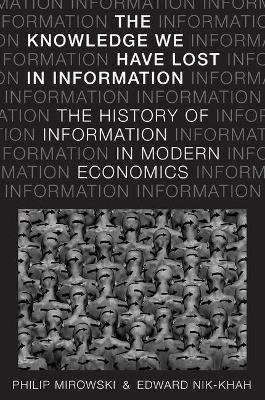
The Knowledge We Have Lost in Information
Oxford University Press Inc (Verlag)
978-0-19-027005-6 (ISBN)
Information is a central concept in economics, and The Knowledge We Have Lost in Information explores its treatment in modern economics. The study of information, far from offering enlightenment, resulted in all matter of confusion for economists and the public.
Philip Mirowski and Edward Nik-Khah argue that the conventional wisdom suggesting "economic rationality" was the core of modern economics is incomplete. In this trenchant investigation, they demonstrate that the history of modern microeconomics is better organized as a history of the treatment of information. The book begins with a brief primer on information, and then shows how economists have responded over time to successive developments on the concept of information in the natural sciences. Mirowski and Nik-Khah detail various intellectual battles that were fought to define, analyze, and employ information in economics. As these debates developed, economists progressively moved away from pure agent conscious self-awareness as a non-negotiable desideratum of economic models toward a focus on markets and their design as information processors. This has led to a number of policies, foremost among them: auction design of resources like the electromagnetic spectrum crucial to modern communications.
The Knowledge We Have Lost in Information provides insight into the interface between disputes within the economics discipline and the increasing role of information in contemporary society. Mirowski and Nik-Shah examine how this intersection contributed to the dominance of neoliberal approaches to economics, politics, and other realms.
PM: Carl Koch Professor of Economics and the History and Philosophy of Science, University of Notre Dame, INEN-K: Associate Professor of Economics, Roanoke College, VA
Contents
List of Tables and Figures
Chapter 1 It's Not Rational
Chapter 2 The Standard Narrative and the Bigger Picture
Chapter 3 Natural Science Inspirations
Chapter 4 The Nobels and the Neoliberals
Chapter 5 The Socialist Calculation Controversy as the Starting Point of the Economics of Information
Chapter 6 Hayek Changes his Mind
Chapter 7 The Neoclassical Economics of Information was incubated at Cowles
Chapter 8 Three Different Modalities of Information in Neoclassical Theory
Chapter 9 Going the Market One Better
Chapter 10 The History of Markets and the Theory of Market Design
Chapter 11 The Walrasian School of Design
Chapter 12 The Bayes-Nash School of Design
Chapter 13 The Experimentalist School of Design
Chapter 14 Hayek and the Schools of Design
Chapter 15 Designs on the Market: The FCC Spectrum Auctions
Chapter 16 Private Intellectuals and Public Perplexity: The TARP
Chapter 17 Artificial Ignorance
| Erscheinungsdatum | 11.07.2017 |
|---|---|
| Verlagsort | New York |
| Sprache | englisch |
| Maße | 216 x 150 mm |
| Gewicht | 408 g |
| Themenwelt | Geschichte ► Teilgebiete der Geschichte ► Wirtschaftsgeschichte |
| Mathematik / Informatik ► Mathematik ► Angewandte Mathematik | |
| Mathematik / Informatik ► Mathematik ► Finanz- / Wirtschaftsmathematik | |
| Wirtschaft ► Allgemeines / Lexika | |
| Wirtschaft ► Volkswirtschaftslehre ► Mikroökonomie | |
| ISBN-10 | 0-19-027005-5 / 0190270055 |
| ISBN-13 | 978-0-19-027005-6 / 9780190270056 |
| Zustand | Neuware |
| Informationen gemäß Produktsicherheitsverordnung (GPSR) | |
| Haben Sie eine Frage zum Produkt? |
aus dem Bereich


